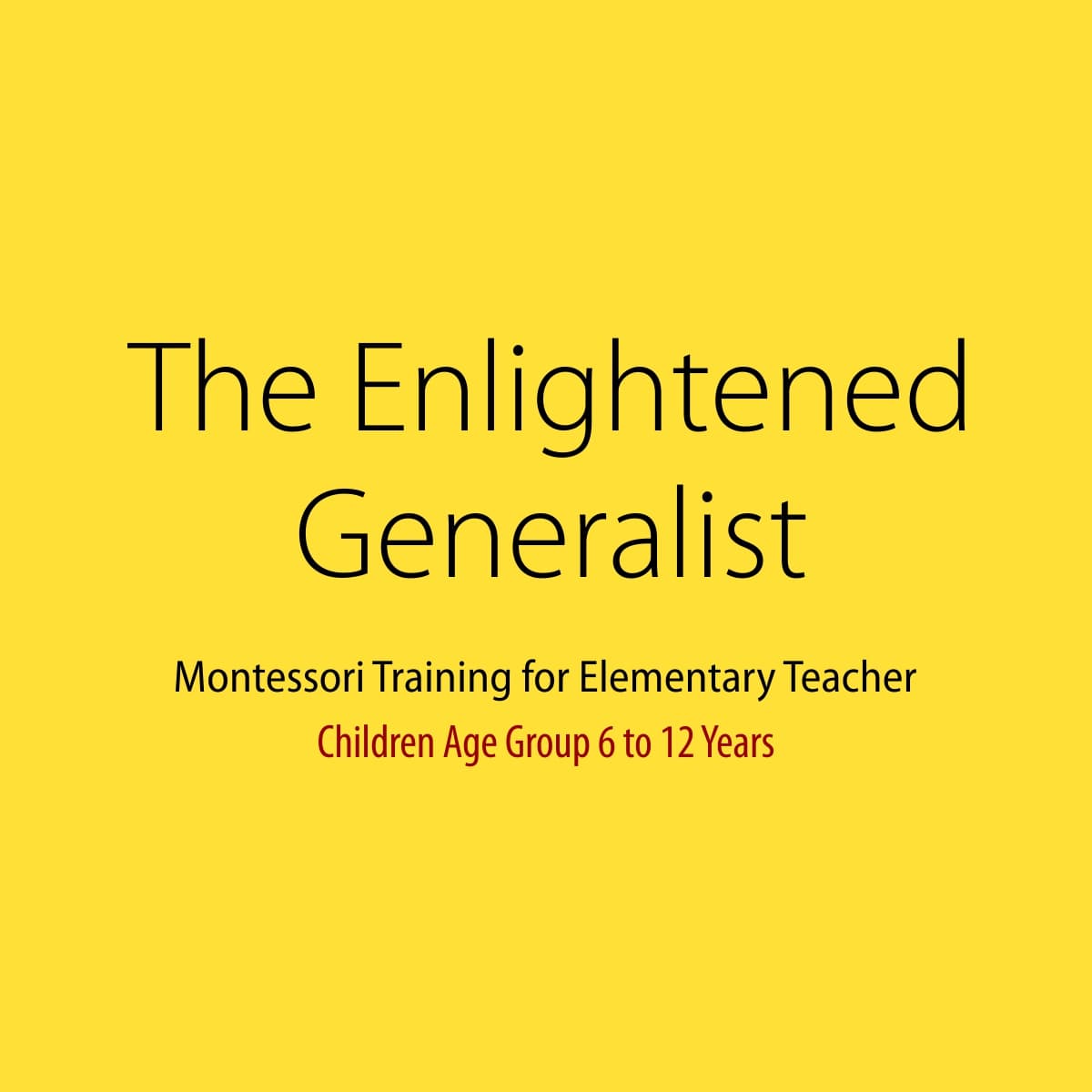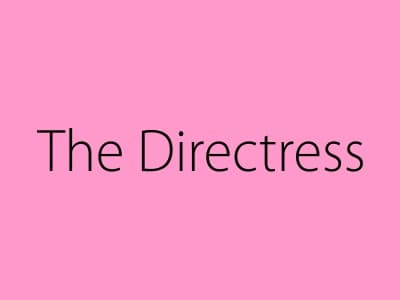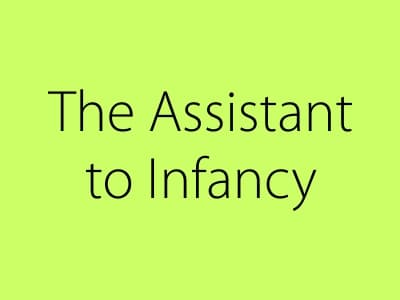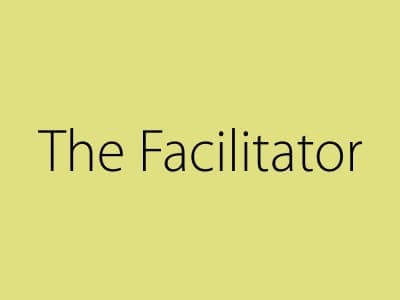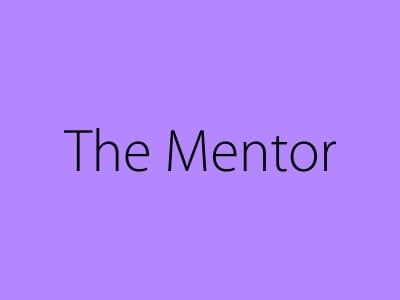Course Info:
The Enlightened Generalist is a comprehensive Montessori Elementary teacher training program designed to equip educators with the knowledge and skills needed for assisting children aged 6 to 12 years. This program offers an in-depth study of Montessori Philosophy and Pedagogy, emphasizing both academic proficiency and socio-emotional development.
Course Ratings:
-
Course Excellence
%
-
Ease of Learning
%
-
Adaptability
%
-
Employed
%
Course Metrics:
Course Overview
How the Course is StructuredTheory Sessions|Practicum Classes|Year Long Project|Internship
| Theory Sessions: 350 hours of lectures, discussions, and interactive sessions covering academic and developmental aspects of elementary education. | |
|---|---|
| Overview | Topics |
| Montessori Philosophy & Pedagogy for Elementary Education |
|
| Child and Adolescent Development |
|
| Classroom Leadership & Program Administration |
|
| Cosmic Education – Simplified for Elementary Learners |
|
| Core Academic Areas |
|
| Enrichment Subjects |
|
| Community Involvement |
|
| Practicum Sessions: 600 hours of guided in-classroom experiences where educators observe and practice Montessori methods. |
|---|
| Practicum hours do not include, independent research, material making, album preparation and/or examinations. |
| Yearlong Project |
|---|
| Up to 16 academic contact hours dedicated to an integrated project focusing on research, reflective practice, and curriculum design. |
| Internship | Inschool Training |
|---|
| 400 hours of in-school training in accredited Montessori Elementary settings, with hands-on teaching assistance and observation. |
| Program Imparts Core Knowledge Categories | |
|---|---|
|
|
If you are looking for any specific detail, please reach us through mail or phone. Thank You.
Course Curriculum
What the Course offers to YouMontessori Philosophy and Pedagogy |Montessori Philosophy & Pedagogy for Elementary Education |Child and Adolescent Development |Classroom Leadership & Program Administration |Cosmic Education – Simplified for Elementary Learners |Core Academic Areas |Enrichment Subjects |Community Involvement
Module 1 of 14 : Montessori Philosophy and Pedagogy for Elementary Education
Module 1 of 14 : Montessori Philosophy and Pedagogy for Elementary Education
| Course Categaory: | Montessori Philosophy and Pedagogy |
| Minimum Course Topics: |
|
| Hours: | 45–75+ hours |
| Course Description: | This module introduces the foundational concepts of Montessori education with a focus on the elementary age group. It examines Montessori’s philosophy and its applicability to older children, highlighting the transition from early childhood methods to elementary educational strategies. |
| Course Work Examples: |
|
| Competencies Assessment: (Suggested Evidence) |
|
| Course Knowledge Categories: | Montessori Theory, Educational Philosophy, Comparative Pedagogy |
| Course Outcomes: |
|
Module 2 of 14 : Child and Adolescent Development
Module 2 of 14 : Child and Adolescent Development
| Course Categaory: | Child and Adolescent Development |
| Minimum Course Topics: |
|
| Hours: | 25–50+ hours |
| Course Description: | This module focuses on the developmental stages unique to elementary-aged children. It covers major theories and research findings, emphasizing the cognitive, social, and emotional aspects of development that influence learning and classroom dynamics. |
| Course Work Examples: |
|
| Competencies Assessment: (Suggested Evidence) |
|
| Course Knowledge Categories: | Cognitive Development, Social and Emotional Growth, Adolescent Transitions |
| Course Outcomes: |
|
Module 3 of 14 : Classroom Leadership & Program Administration
Module 3 of 14 : Classroom Leadership & Program Administration
| Course Categaory: | Classroom Management and Administration |
| Minimum Course Topics: |
|
| Hours: | 25–45+ hours |
| Course Description: | This module equips future educators with the leadership and administrative skills required to run a successful Montessori elementary classroom. Participants will explore effective strategies for classroom management, documentation, and program administration. |
| Course Work Examples: |
|
| Competencies Assessment: (Suggested Evidence) |
|
| Course Knowledge Categories: | Educational Administration, Leadership Strategies, Communication and Recordkeeping |
| Course Outcomes: |
|
Module 4 of 14 : Curriculum Implementation – Cosmic Education: Simplified for Early Learners
Module 4 of 14 : Curriculum Implementation – Cosmic Education: Simplified for Early Learners
| Course Categaory: | Curriculum Implementation – Cosmic Education |
| Minimum Course Topics: |
|
| Hours: | 35–75+ hours |
| Course Description: | This module introduces cosmic education by simplifying grand narratives about the universe for elementary learners. It traces the origin of the cosmos and life—from the unfolding of the universe to human evolution—while contextualizing the emergence of writing and numerical thinking in history. |
| Course Work Examples: |
|
| Competencies Assessment: (Suggested Evidence) |
|
| Course Knowledge Categories: | Cosmic Narratives, Evolutionary and Historical Concepts, Foundational Scientific Understanding |
| Course Outcomes: |
|
Module 5 of 14 : Curriculum Implementation – Core Academic Areas: Language & Literature
Module 5 of 14 : Curriculum Implementation – Core Academic Areas: Language & Literature
| Course Categaory: | Curriculum Implementation: Language & Literature |
| Minimum Course Topics: |
|
| Hours: | 35–75+ hours |
| Course Description: | Focused on building robust language and literature skills, this module emphasizes strategies for teaching reading, writing, and critical analysis. Participants will learn how to integrate diverse literary resources into engaging lesson plans. |
| Course Work Examples: |
|
| Competencies Assessment: (Suggested Evidence) |
|
| Course Knowledge Categories: | Language Arts, Literacy Development, Creative Expression |
| Course Outcomes: |
|
Module 6 of 14 : Curriculum Implementation – Core Academic Areas: Mathematics and Logical Reasoning
Module 6 of 14 : Curriculum Implementation – Core Academic Areas: Mathematics and Logical Reasoning
| Course Categaory: | Curriculum Implementation: Mathematics |
| Minimum Course Topics: |
|
| Hours: | 35–75+ hours |
| Course Description: | This module covers the teaching of foundational and advanced mathematics concepts through interactive and hands-on methodologies. Emphasis is placed on fostering logical reasoning and applying mathematical principles in everyday learning. |
| Course Work Examples: |
|
| Competencies Assessment: (Suggested Evidence) |
|
| Course Knowledge Categories: | Numeracy and Mathematical Logic, Problem-Solving Strategies, Abstract Thinking Development |
| Course Outcomes: |
|
Module 7 of 14 : Curriculum Implementation – Core Academic Areas: Science and Environmental Studies
Module 7 of 14 : Curriculum Implementation – Core Academic Areas: Science and Environmental Studies
| Course Categaory: | Curriculum Implementation: Science |
| Minimum Course Topics: |
|
| Hours: | 35–75+ hours |
| Course Description: | This module is designed to ignite curiosity in science by combining theory with practical experiments. It covers fundamental science topics and encourages a hands-on approach to learning through experiments and environmental activities. |
| Course Work Examples: |
|
| Competencies Assessment: (Suggested Evidence) |
|
| Course Knowledge Categories: | Scientific Inquiry, Environmental Awareness, Experimentation and Observation |
| Course Outcomes: |
|
Module 8 of 14 : Curriculum Implementation – Core Academic Areas: Social Studies and Cultural Awareness
Module 8 of 14 : Curriculum Implementation – Core Academic Areas: Social Studies and Cultural Awareness
| Course Categaory: | Curriculum Implementation: Social Studies |
| Minimum Course Topics: |
|
| Hours: | 35–75+ hours |
| Course Description: | This module equips educators with strategies to develop a comprehensive social studies curriculum. Emphasis is on cultivating cultural awareness, promoting critical analysis, and relating historical events to current social dynamics. |
| Course Work Examples: |
|
| Competencies Assessment: (Suggested Evidence) |
|
| Course Knowledge Categories: | Historical Analysis, Cultural Diversity, Global Awareness |
| Course Outcomes: |
|
Module 9 of 14 : Curriculum Implementation – Enrichment Subjects: Practical Life Skills
Module 9 of 14 : Curriculum Implementation – Enrichment Subjects: Practical Life Skills
| Course Categaory: | Curriculum Implementation – Practical Life Skills |
| Minimum Course Topics: |
|
| Hours: | 35–75+ hours |
| Course Description: | This module focuses on integrating practical life skills into the Montessori curriculum. It combines theoretical learning with hands-on practice, enabling teachers to instruct elementary students in essential life skills. Through experiential learning, educators develop strategies to foster independence while promoting creativity, environmental awareness, and financial literacy. |
| Course Work Examples: |
|
| Competencies Assessment: (Suggested Evidence) |
|
| Course Knowledge Categories: | Practical Life Skills Integration, Nutritional and Culinary Education, Environmental and Gardening Practices, Creative and Fine Motor Development, Financial Literacy and Entrepreneurial Concepts |
| Course Outcomes: |
|
Module 10 of 14 : Curriculum Implementation – Enrichment Subjects: Fine Arts, Music & Physical Education
Module 10 of 14 : Curriculum Implementation – Enrichment Subjects: Fine Arts, Music & Physical Education
| Course Categaory: | Curriculum Implementation: Fine Arts & Physical Education |
| Minimum Course Topics: |
|
| Hours: | 15–35+ hours |
| Course Description: | This module addresses the importance of creative and physical activities in holistic child development. It provides tools and techniques for integrating fine arts, music, and physical education into daily lessons. |
| Course Work Examples: |
|
| Competencies Assessment: (Suggested Evidence) |
|
| Course Knowledge Categories: | Creative Expression, Physical Development, Cross-Curricular Integration |
| Course Outcomes: |
|
Module 11 of 14 : Curriculum Implementation – Enrichment Subjects: Community Engagement & Social Development
Module 11 of 14 : Curriculum Implementation – Enrichment Subjects: Community Engagement & Social Development
| Course Categaory: | Curriculum Implementation – Community Engagement & Social Development |
| Minimum Course Topics: |
|
| Hours: | 10–40+ hours |
| Course Description: | This module emphasizes the social and community aspects of education, fostering respect, responsibility, and collaboration. It integrates lessons on grace, courtesy, and leadership with practical experiences that connect students to nature and community-based programs such as farm initiatives. |
| Course Work Examples: |
|
| Competencies Assessment: (Suggested Evidence) |
|
| Course Knowledge Categories: | Social and Ethical Learning, Community and Environmental Awareness, Leadership Development |
| Course Outcomes: |
|
Module 12 of 14 : Curriculum Implementation – Enrichment Subjects: Outdoor & Experiential Learning
Module 12 of 14 : Curriculum Implementation – Enrichment Subjects: Outdoor & Experiential Learning
| Course Categaory: | Curriculum Implementation – Outdoor & Experiential Learning |
| Minimum Course Topics: |
|
| Hours: | 15–35+ hours |
| Course Description: | This module promotes experiential learning through direct interaction with the natural environment. Students participate in camping, outdoor survival activities, and systematic observation of nature, complemented by reflective journaling to build resilience and a connection with nature. |
| Course Work Examples: |
|
| Competencies Assessment: (Suggested Evidence) |
|
| Course Knowledge Categories: | Experiential and Environmental Learning, Practical Survival Skills, Reflective Observation and Journaling |
| Course Outcomes: |
|
Module 13 of 14 : Curriculum Implementation – Enrichment Subjects: Montessori Games, Play & Sports
Module 13 of 14 : Curriculum Implementation – Enrichment Subjects: Montessori Games, Play & Sports
| Course Categaory: | Curriculum Implementation – Games, Play & Sports |
| Minimum Course Topics: |
|
| Hours: | 15–35+ hours |
| Course Description: | This module focuses on integrating games, play, and sports into the Montessori curriculum. It covers structured activities and free play that enhance cognitive, emotional, physical, and social development, while nurturing creativity and self-expression in elementary learners. |
| Course Work Examples: |
|
| Competencies Assessment: (Suggested Evidence) |
|
| Course Knowledge Categories: | Montessori Pedagogy in Play, Physical Education and Motor Skills, Social & Emotional Learning, Creative Play Strategies |
| Course Outcomes: |
|
Module 14 of 14 : Community Involvement and Partnerships with Families
Module 14 of 14 : Community Involvement and Partnerships with Families
| Course Categaory: | Community Involvement and Family Partnerships |
| Minimum Course Topics: |
|
| Hours: | 10–40+ hours |
| Course Description: | This module focuses on developing effective communication and collaboration strategies for building community and parental involvement. It emphasizes the importance of fostering a supportive network that enhances educational outcomes. |
| Course Work Examples: |
|
| Competencies Assessment: (Suggested Evidence) |
|
| Course Knowledge Categories: | Community Engagement, Partnership Development, Communication Strategies |
| Course Outcomes: |
|


